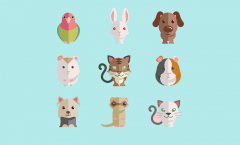Employers and Universities: Work with us?

Animal apprenticeship: 2 ways to begin your animal career
If you’re wild about animals, what could be better than a career devoted to caring for our furry friends?
Well, you’ll be delighted to learn that you can begin your animal career straight from school or college by embarking on an apprenticeship in animal care or veterinary nursing. Read on to find out if this could be the, ahem, natural career choice for you.
'You could train to be a veterinary nurse or animal care worker with an apprenticeships'
What animal apprenticeships can I do?
There are two main types of animal apprenticeships available today:
- Animal care: Learn to look after animals in a boarding or farm or similar setting.
- Veterinary: Train to work with sick animals and animal visiting at the vet.
Apprenticeships in animal care
Animal care apprenticeships involve working with animals in a whole range of settings. You could work at a cattery, kennels or other boarding accommodation, an animal charity, a farm, or even with the armed forces (who have a lot of dogs and horses working alongside their human service personnel). You could also work for a dog walking or pet home care service.
What will it involve?
The tasks you’ll learn how to carry out will depend on the service your employer provides, as well as the kinds of animals they deal with. For example, if you work at a kennels, your training will be focused on caring for dogs. Alternatively, you could work for a cattery and kennels (twice the fun!) – we even spotted an apprenticeship at a cattery with an alpaca farm attached!
The skills you develop will be transferable to the care of other species, although you may need some top-up training if you move employers. After all, caring for a tortoise is very different to looking after horses! Here are some of the duties you could carry out:
- Feeding animals.
- Handling, exercising and playing with animals.
- Cleaning out pens, kennels and other enclosures.
- Spotting when an animal may be unwell.
- Controlling and restraining animals.
These are some of the core tasks you’ll be expected to carry out, wherever you work. If you work for a grooming service, you might also receive training in how to pamper your furry clients – learning how to trim their fur, carry out a pet pedicure and so on.
What skills will I need?
As well as having a passion for animals, you’ll need to be:
- Hardworking and happy to carry out physically demanding work.
- Comfortable with a bit of muck, and not too squeamish (the chances are you’ll have to deal with poo).
- Confident with animals, and able to build a rapport with them.
- Caring, compassionate and patient.
- Fast-learning and able to use your initiative.
- Able to work long hours, and happy working outdoors in all weathers (depending on the role).
What grades do I need?
As always, we recommend a level C+/4+ in English and maths as this will help you keep your options open. However, apprenticeships are available with lower requirements (for example Ds) or simply “basic English and maths”. If you’re accepted at this level, your employer will help you gain functional skills so you have a basic level of numeracy and literacy.
What qualifications will I gain?
Apprenticeships in animal care are normally at level 2 (intermediate), which means you’ll gain qualifications equivalent to 5 GCSEs at grade C+/4+.
Veterinary nursing
As a veterinary nurse, you’ll help care for domestic animals like cats, dogs and rodents on their visit to the vet’s, carrying out tasks like:
- Carrying out vaccinations and administering medicines, wormings etc.
- Examining animals.
- Preparing animals for surgery and helping out in the theatre.
- Cleaning out animals staying at the practice and looking after their wellbeing.
- Carrying out X-rays.
You could work for a private veterinary practice or a charity vet’s.
What skills do I need?
- Confident with animals, and able to build a relationship with them.
- Caring, compassionate and patient.
- Hard-working and prepared to work unsociable hours, and to carry out physical work.
- Good problem-solving skills.
- Confident carrying out minor medical procedures, and assisting with surgery.
What grades do I need?
Generally, you will need 5 C+/4+ GCSEs, including in English, maths and science. Your employer may accept vocational qualifications or functional skills instead.
What qualifications will I get?
You’ll gain a level 3 diploma in veterinary nursing (equivalent to 2 A-levels), which you’ll study for at university or college once a week or in a block. This will back up your practical experience you gain at work with the theory behind the tasks you’ll carry out as a veterinary nurse. You’ll learn about things like anatomy, medications and medical practices, nutrition, and techniques. Training usually lasts 2-3 years.
How can I apply for a veterinary nurse apprenticeship?
You can apply straight to a vet’s practice. Veterinary nurse training should be provided by a practice which is approved by the Royal College of Veterinary Surgeons (RCVS). You can find a list of these “approved training practices” on the RCVS website.
If you’ve animals on the brain, check out this list of animal jobs you could do.
You might also like…
Image credits
Lead image by Freepik
